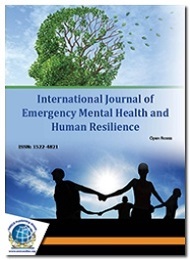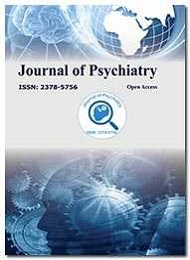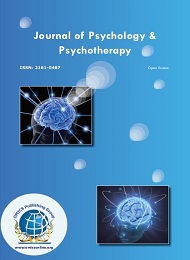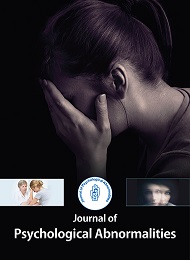Theme: Dealing with Mental Health and Psychological Effects of Covid-19
Psychiatric 2022
On behalf of Organizing Committee we warmly invite all the members and benefactors from worldwide to 40th Global Psychiatry and Mental Health Conference which will be held on October 3-4, 2022 in London, UK over the subject "Dealing with Mental Breakdown during COVID 19".
We welcome you to join us at Psychiatric 2022 where you will make certain to have an important involvement in researchers from around the globe. Liberal reaction and dynamic interest from the Editorial Board Members of meeting related Journals just as from the researchers, scientists and pioneers in the field of psychology, psychiatry and mental health will make this gathering as one of the best and beneficial events in 2022.
We keep on having huge issues with Negativity, drug misuse, discouragement, Organizational weight, and mental prosperity. As the world catching under so much pressure and antagonism, the light of positive brain research is the main expectation toward the finish of the passage, Psychiatry is the arising field which adds huge dynamism into the brain research world.
The Psychiatric 2022 is a remarkable stage for an engaged arrangement of the flow research in the field of assortment of cutting edge research subjects including Psychopharmacology, Psychiatry Disorders, Psychology, Psychotherapy, Neurodegenerative Disorders, Psychosomatic medicine, Mental Health and Wellness, Dementia, Obsessive Compulsive Disorders, Psychosomatic Treatment, Mental Health Nursing encounters of different treatment strategies.
Psychiatry and Mental Health Conference incorporates brief Keynote introductions, oral talks, banner introductions, delegate sees, board talks, workshop and shows. Likewise, top notch research commitments portraying unique and unpublished aftereffects of calculated, valuable, exact, exploratory, or hypothetical work in every aspect of Psychiatry Disorders and Psychosomatic Medicine are sincerely welcomed for introduction at the gathering.
Conference Highlights: Psychological Medicine & Psychological State Nursing| Mental Health and Well-being | Mental Health | Mental Disorders | Women’s mental Health | Mental Health & Rehabilitation | Mental health Education and Training | Addiction and Mental Health | Adult and Geriatric Medical specialty | Stress, Anxiety and Depression | Mental Health Awareness | Psychiatry and Science Practices | Mindfulness Yoga & Medication | Psychopharmacology Role: Mental Health | Schizophrenia
Target Audience:
- Psychologists, Psychiatrists, Neuropsychiatrists, Psychotherapists
- Mental Health Experts
- Nurse Practitioners
- Professors, Associate Professors, Assistant Professors
- Ph.D. Scholars
- Directors, CEO’s of Organizations
- Association Presidents, Vice Presidents, and Professionals
- Noble laureates in Health Care and Medicine
- Pharmaceutical development companies
- Research Institutes and members
- Graduates and Postgraduates
- Medical devices Manufacturing Companies
- Training Institutes
- Business Entrepreneurs
Track 1: Psychiatry
Psychiatry is the therapeutic claim devoted to the finding, avoidance, study, and treatment of the mental issue. Psychiatry is the principal branch of solution concentrated on the analysis, treatment, and anticipation of mental, passionate and behavioural scatters. These abnormalities identified with mood, behaviour, cognizance, and observations. Beginning mental evaluation of a person regularly starts with a case history and mental status examination.
Recommended Conferences:
Psychiatry Conferences | Mental Health Conferences | Mental Disorders Conferences | Psychosomatic Medicine Conferences | Psychiatry Disorders Conferences USA | Behaviour Science Conferences | Psychology Conferences | Mental Health and Human Resilience Conferences | Psychotherapy Conferences 2021 | Dementia Conferences | Neuroscience Conferences
Track 2: Mental Health and Covid-19
Fear, worry, and stress are ordinary reactions to saw or genuine dangers, and now and again when we are confronted with vulnerability or the obscure. So it is ordinary and reasonable that individuals are encountering dread with regards to the COVID-19 pandemic. Added to the dread of getting the infection in a pandemic, for example, COVID-19 are the huge changes to our everyday lives as our developments are confined on the side of endeavors to contain and hinder the spread of the infection. Confronted with new real factors of telecommuting, brief joblessness, self-teaching of youngsters, and absence of actual contact with other relatives, companions and associates, it is significant that we care for our psychological, just as our physical, wellbeing.
Recommended Conferences:
Psychiatry Conferences | Mental Health Conferences | Mental Disorders Conferences | Psychosomatic Medicine Conferences | Psychiatry Disorders Conferences USA | Behaviour Science Conferences | Psychology Conferences | Mental Health and Human Resilience Conferences | Psychotherapy Conferences 2022 | Dementia Conferences | Neuroscience Conferences
Track 3: Psychosomatic Medicine
Psychosomatic medicine is a newly licensed subspecialty in the field of psychiatry; it is also known as consultation-liaison psychiatry. C-L psychiatry provides knowledge, practice, and instruction in the relation between mental and physical illness. This field is associated with services like diagnosis, therapeutics and research of illnesses in this area. Hence it connects psychiatry and other medical specialties, so that physicians and psychiatrists can discuss how to best manage patients with psychosomatic illness.
Recommended Conferences:
Psychiatry Conferences | Mental Health Conferences | Mental Disorders Conferences | Psychosomatic Medicine Conferences | Psychiatry Disorders Conferences USA | Behaviour Science Conferences | Psychology Conferences | Mental Health and Human Resilience Conferences | Psychotherapy Conferences 2022 | Dementia Conferences | Neuroscience Conferences
Track 4: Role of Tele-Psychiatry during Lockdown
Telepsychiatry is the application of telemedicine to the specialty field of psychiatry. The term typically describes the delivery of psychiatric assessment and care through video conferencing. Telepsychiatry services can be offered through intermediary companies that partner with facilities to increase care capacities, or by individual providers or provider groups. Most commonly, Telepsychiatry encounters take place at medical facilities under the supervision of onsite staff, though at-home models are becoming accepted if they are in compliance with HIPAA standards.
Recommended Conferences:
Psychiatry Conferences | Mental Health Conferences | Mental Disorders Conferences | Psychosomatic Medicine Conferences | Psychiatry Disorders Conferences USA | Behaviour Science Conferences | Psychology Conferences | Mental Health and Human Resilience Conferences | Psychotherapy Conferences 2022 | Dementia Conferences | Neuroscience Conferences
Track 5: Child and Adolescent Psychiatry
Child and Adolescent Psychiatry is a multidisciplinary scholarly periodical that encourages research on the diagnosis, treatment, and prevention of mental disorders in children, adolescents, and their families. It investigates the biopsychosocial factors that influence the development and course of these psychiatric disorders and treatment responses to various interventions. It mainly focuses on developmental disorders (Autism spectrum disorder), Disorders of Attention and Behaviour, Psychotic Disorders, Mood Disorders, Anxiety Disorders, Eating Disorders and Gender Identity Disorder.
Recommended Conferences:
Psychiatry Conferences | Mental Health Conferences | Mental Disorders Conferences | Psychosomatic Medicine Conferences | Psychiatry Disorders Conferences USA | Behaviour Science Conferences | Psychology Conferences | Mental Health and Human Resilience Conferences | Psychotherapy Conferences 2022 | Dementia Conferences | Neuroscience Conferences
Track 6: Drug abuse and Addiction
Drug abuse is a serious public health problem that affects almost every community and family in some way. You may abuse drugs to feel good, ease stress, or avoid reality. But usually, you’re able to change your unhealthy habits or stop using altogether. Drug addiction isn’t about just heroin, cocaine, or other illegal drugs. You can get addicted to alcohol, nicotine, opioid painkillers, and other legal substances. This may contain disorders including legal and illegal drugs, gambling, sex, and other impulse control disorders. Addiction psychiatrists are substance abuse experts. Growing amount of scientific knowledge, such as the health effects and treatments to substance abuse, has led to advancements in the field of addiction psychiatry.
Recommended Conferences:
Psychiatry Conferences | Mental Health Conferences | Mental Disorders Conferences | Psychosomatic Medicine Conferences | Psychiatry Disorders Conferences USA | Behaviour Science Conferences | Psychology Conferences | Mental Health and Human Resilience Conferences | Psychotherapy Conferences 2022 | Dementia Conferences | Neuroscience Conferences
Track 7: Psychosomatic Disorders
Psychosomatic Disorders is a condition in which psychological stresses adversely affect physiological (somatic) functioning to the point of distress. It is a condition of dysfunction or structural damage in bodily organs through inappropriate activation of the involuntary nervous system and the glands of internal secretion. Psychosomatic disorders resulting from stress may include hypertension, respiratory ailments, gastrointestinal disturbances, migraine and tension headaches, pelvic pain, impotence, frigidity, dermatitis, and ulcers.
Recommended Conferences:
Psychiatry Conferences | Mental Health Conferences | Mental Disorders Conferences | Psychosomatic Medicine Conferences | Psychiatry Disorders Conferences USA | Behaviour Science Conferences | Psychology Conferences | Mental Health and Human Resilience Conferences | Psychotherapy Conferences 2022 | Dementia Conferences | Neuroscience Conferences
Track 8: Psychotherapy
Psychotherapy is a way to help people with a broad variety of mental illnesses and emotional difficulties. Psychotherapy can help eliminate or control troubling symptoms, so a person can function better and can increase well-being and healing. Psychotherapy is a general term for treating mental health problems by talking with a psychiatrist, psychologist or other mental health providers.
Recommended Conferences:
Psychiatry Conferences | Mental Health Conferences | Mental Disorders Conferences | Psychosomatic Medicine Conferences | Psychiatry Disorders Conferences USA | Behaviour Science Conferences | Psychology Conferences | Mental Health and Human Resilience Conferences | Psychotherapy Conferences 2022 | Dementia Conferences | Neuroscience Conferences
Track 9: Cognitive Behavioral Therapy
Cognitive behavioral therapy (CBT) is a short-term, goal-oriented psychotherapy treatment that takes a hands-on, practical approach to problem-solving. Its goal is to change patterns of thinking or behavior that are behind people’s difficulties, and so change the way they feel. It is used to help treat a wide range of issues in a person’s life, from sleeping difficulties or relationship problems to drug and alcohol abuse or anxiety and depression.
Recommended Conferences:
Psychiatry Conferences | Mental Health Conferences | Mental Disorders Conferences | Psychosomatic Medicine Conferences | Psychiatry Disorders Conferences USA | Behaviour Science Conferences | Psychology Conferences | Mental Health and Human Resilience Conferences | Psychotherapy Conferences 2022 | Dementia Conferences | Neuroscience Conferences
Track 10: Alzheimer’s and Dementia
Alzheimer's is a type of dementia that causes problems with memory, thinking and behaviour. Dementia is the loss of cognitive functioning—thinking, remembering, and reasoning—and behavioural abilities to such an extent that it interferes with a person's daily life and activities. These functions include memory, language skills, visual perception, problem-solving, self-management, and the ability to focus and pay attention. Some people with dementia cannot control their emotions, and their personalities may change. The rate at which the disease progresses is different for everyone, but on average, people with Alzheimer’s live for eight years after symptoms begin. While there are currently no treatments to stop Alzheimer’s disease from progressing, there are medications to treat dementia symptoms.
Recommended Conferences:
Psychiatry Conferences | Mental Health Conferences | Mental Disorders Conferences | Psychosomatic Medicine Conferences | Psychiatry Disorders Conferences USA | Behaviour Science Conferences | Psychology Conferences | Mental Health and Human Resilience Conferences | Psychotherapy Conferences 2022 | Dementia Conferences | Neuroscience Conferences
Track 11: Psychopharmacology
Psychopharmacology is demarcated as a scientific study that deals with the influence of medicines have on mood, perception, discerning, and activities. Psychopharmacology is differentiated from Neuropsychopharmacology that highlights the relationship between drug made changes within the working. Psychoactive drugs relate mainly with specific receptors or target sites found in the nervous system to persuade a pervasive change of cells within the nervous system and alter the consciousness and behavioural changes in psychological or physiological functions.
Recommended Conferences:
Psychiatry Conferences | Mental Health Conferences | Mental Disorders Conferences | Psychosomatic Medicine Conferences | Psychiatry Disorders Conferences USA | Behaviour Science Conferences | Psychology Conferences | Mental Health and Human Resilience Conferences | Psychotherapy Conferences 2022 | Dementia Conferences | Neuroscience Conferences
Track 12: Psychology
Psychology is the branch of science which deals with the science of mind and behavior. It studies with the mental and behavioral characteristics of an individual or a group and gives solution for many complex aspects. Psychology is a challenging discipline and it includes many sub-fields. The professional practitioner is called Psychologist and the research works carried is of great values as it covers the social issues.
Recommended Conferences:
Psychiatry Conferences | Mental Health Conferences | Mental Disorders Conferences | Psychosomatic Medicine Conferences | Psychiatry Disorders Conferences USA | Behaviour Science Conferences | Psychology Conferences | Mental Health and Human Resilience Conferences | Psychotherapy Conferences 2022 | Dementia Conferences | Neuroscience Conferences
Track 13: Behavioural Science & Medicine
Behavioural science is the systematic analysis of human behaviour through experiments and observations. Observation and experiments are the two main sources of Behavioural Science. Behavioural medicine is the interdisciplinary field concerned with the development and integration of behavioural, psychosocial, and biomedical science knowledge and techniques relevant to the understanding of health and illness, and the application of this knowledge and these techniques to prevention, diagnosis, treatment and rehabilitation.
Recommended Conferences:
Psychiatry Conferences | Mental Health Conferences | Mental Disorders Conferences | Psychosomatic Medicine Conferences | Psychiatry Disorders Conferences USA | Behaviour Science Conferences | Psychology Conferences | Mental Health and Human Resilience Conferences | Psychotherapy Conferences 2022 | Dementia Conferences | Neuroscience Conferences
Track 14: Neuropsychology and Neurodegenerative Disorders
Neuropsychology concerned with the applied science of brain-behavior relationships. This field incorporates principles of assessment and intervention based upon the scientific research of human behavior as it relates to the normal and abnormal functioning of the central nervous system. Neurodegenerative diseases are incurable and debilitating conditions that result in progressive degeneration and/or death of nerve cells. This causes problems with movement (called ataxias), or mental functioning (called dementias). Assessment includes neuropsychological tests, patient history, qualitative observation, neuroimaging, and diagnostic procedures.
Recommended Conferences:
Psychiatry Conferences | Mental Health Conferences | Mental Disorders Conferences | Psychosomatic Medicine Conferences | Psychiatry Disorders Conferences USA | Behaviour Science Conferences | Psychology Conferences | Mental Health and Human Resilience Conferences | Psychotherapy Conferences 2022 | Dementia Conferences | Neuroscience Conferences
Track 15: Women and Mental Health
Depression, anxiety, psychological distress, sexual violence, domestic violence and escalating rates of substance use affect women than men across different countries and different settings. Pressures created by their multiple roles, gender discrimination and associated factors of poverty, hunger, malnutrition, overwork, domestic violence, and sexual abuse, combine to account for women's poor mental health. When women dare to disclose their problems, many health workers tend to have gender biases which lead them to either over-treat or under-treat women.
Recommended Conferences:
Psychiatry Conferences | Mental Health Conferences | Mental Disorders Conferences | Psychosomatic Medicine Conferences | Psychiatry Disorders Conferences USA | Behaviour Science Conferences | Psychology Conferences | Mental Health and Human Resilience Conferences | Psychotherapy Conferences 2022 | Dementia Conferences | Neuroscience Conferences
Track 16: Bipolar Disorder and Schizophrenia
Bipolar disorder and schizophrenia are severe mental illnesses commonly referred to as psychotic disorders, meaning symptoms can include psychosis—impaired thoughts and emotions severe enough to induce a disconnect from reality. Bipolar disorder causes severe shifts in mood, ranging from depressive lows to manic highs. Schizophrenia is a chronic and severe mental health disorder that affects how a person thinks feels and behaves. People with schizophrenia may seem like they have lost touch with reality and can experience hallucinations, delusions, and disorganized thinking.
Recommended Conferences:
Psychiatry Conferences | Mental Health Conferences | Mental Disorders Conferences | Psychosomatic Medicine Conferences | Psychiatry Disorders Conferences USA | Behaviour Science Conferences | Psychology Conferences | Mental Health and Human Resilience Conferences | Psychotherapy Conferences 2022 | Dementia Conferences | Neuroscience Conferences
Track 17: Personality Disorders
Personality is the way of thinking, feeling and behaving that makes a person different from other people. A personality disorder is a way of thinking, feeling and behaving that deviates from the expectations of the culture, causes distress or problems functioning, and lasts over time. This causes significant problems and limitations in relationships, social activities, work, and school. An individual’s personality is influenced by experiences, environment (surroundings, life situations) and inherited characteristics.
Recommended Conferences:
Psychiatry Conferences | Mental Health Conferences | Mental Disorders Conferences | Psychosomatic Medicine Conferences | Psychiatry Disorders Conferences USA | Behaviour Science Conferences | Psychology Conferences | Mental Health and Human Resilience Conferences | Psychotherapy Conferences 2022 | Dementia Conferences | Neuroscience Conferences
Track 18: Anxiety, Stress, and Depression
Anxiety is a feeling described by an upsetting condition of inward disturbance, frequently accompanied by nervous behavior like pacing back and forth, substantial objections, and rumination. Anxiety is the desire of future threat. Depression is a condition of low mood and antipathy for a movement that can influence any one’s thoughts, behavior, tendencies, emotions, and feeling of prosperity. Stress, a type of mental agony is a feeling of strain and pressure. Stress can build the danger for strokes, heart attacks, ulcers, and depression.
Recommended Conferences:
Psychiatry Conferences | Mental Health Conferences | Mental Disorders Conferences | Psychosomatic Medicine Conferences | Psychiatry Disorders Conferences USA | Behaviour Science Conferences | Psychology Conferences | Mental Health and Human Resilience Conferences | Psychotherapy Conferences 2022 | Dementia Conferences | Neuroscience Conferences
Track 19: Sleep Disorders
Sleep disorders involve problems with the quality, timing and amount of sleep, which cause problems with functioning and distress during the daytime. Sleep difficulties are linked to both physical and emotional problems. Sleep problems can both contribute to or exacerbate mental health conditions and be a symptom of other mental health conditions.
Recommended Conferences:
Psychiatry Conferences | Mental Health Conferences | Mental Disorders Conferences | Psychosomatic Medicine Conferences | Psychiatry Disorders Conferences USA | Behaviour Science Conferences | Psychology Conferences | Mental Health and Human Resilience Conferences | Psychotherapy Conferences 2022 | Dementia Conferences | Neuroscience Conferences
Track 20: Obsessive Compulsive Disorder
Obsessive-compulsive disorder (OCD) is a mental health condition characterized by distressing, intrusive, obsessive thoughts and repetitive, compulsive physical or mental acts. The obsessions or compulsions cause marked distress, are time-consuming, and interfere with a person's normal function. Indications of OCD can occur in children and teenagers, with the disease usually beginning gradually and worsening with age. Symptoms of OCD can be mild or severe. Some people experience obsessive thoughts only, without engaging in compulsive behavior.
Recommended Conferences:
Psychiatry Conferences | Mental Health Conferences | Mental Disorders Conferences | Psychosomatic Medicine Conferences | Psychiatry Disorders Conferences USA | Behaviour Science Conferences | Psychology Conferences | Mental Health and Human Resilience Conferences | Psychotherapy Conferences 2022 | Dementia Conferences | Neuroscience Conferences
Track 21: Mental Health Nursing
Mental nursing or psychological well-being nursing is the selected position of a nursing that has represented considerable authority in emotional wellness and watches over individuals of any age with dysfunctional behaviour or mental trouble, for example, schizophrenia, bipolar turmoil, psychosis, gloom, dementia and some more.
Recommended Conferences:
Psychiatry Conferences | Mental Health Conferences | Mental Disorders Conferences | Psychosomatic Medicine Conferences | Psychiatry Disorders Conferences USA | Behaviour Science Conferences | Psychology Conferences | Mental Health and Human Resilience Conferences | Psychotherapy Conferences 2022 | Dementia Conferences | Neuroscience Conferences
Covid-19's Widespread Impact On Mental Health
Alongside the conspicuous actual ramifications for individuals who contract Covid-19, the pandemic is having a staggering emotional well-being sway on individuals everywhere on the world. The despondency among the individuals who have lost friends and family, the disquiet at losing an employment and monetary security, the dissatisfaction of lockdowns, the difficulties of telecommuting while at the same time dealing with kids alongside the dread of getting the illness have all negatively affected psychological well-being.
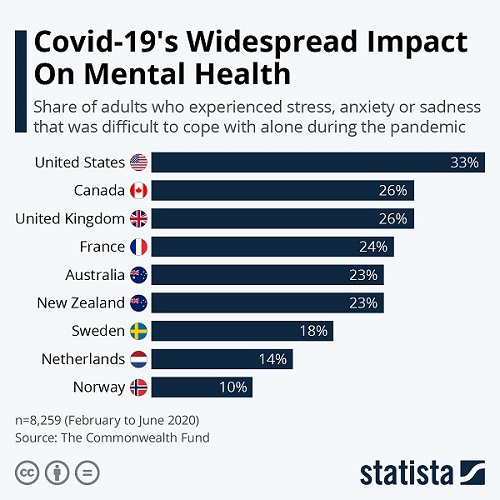
The Commonwealth Fund and research firm SSRS recently delivered a review about the issue, focusing on the circumstance across ten top high income charts (no information was accessible for Germany for the accompanying infographic). It found that 33% of individuals in the United States said they encountered pressure, nervousness or bitterness that was hard to adapt to alone since the episode of Covid-19. Around a fourth of respondents in Canada, the UK, and France likewise said they had endured psychological well-being issues because of the pandemic.
Effect of Covid-19 on young people:
- 15- to 24-year-olds worry most about the pandemic’s effect on their mental health.
- Young people in poorer countries are more likely to be concerned about jobs and income.
- Global survey shows getting sick from the virus is low on the list of concerns.
It's frequently said infections don't segregate. In any case, how the COVID-19 pandemic influences you fluctuates incredibly relying upon numerous variables – specifically, when you were conceived. The youthful might be far more averse to turn out to be truly sick or kick the bucket, yet that doesn't make them safe from the harming results of this phenomenal illness.
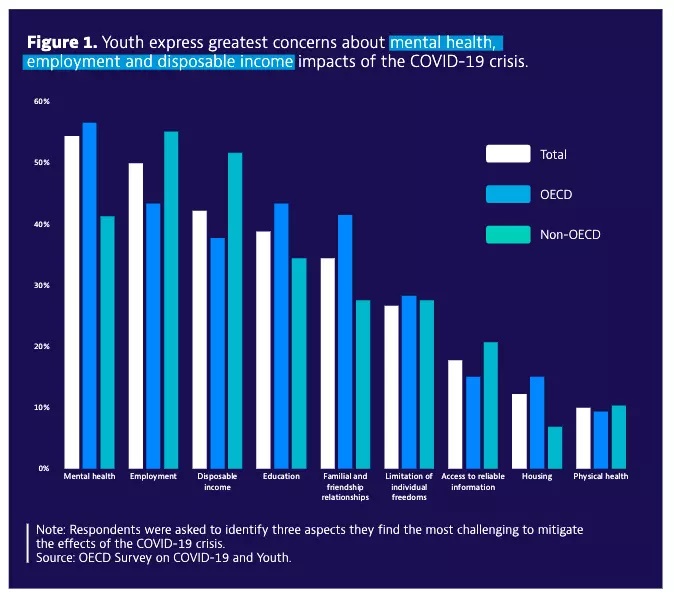
Expectations of an impending psychological well-being emergency have been made since the beginning of the pandemic, with endless individuals cut off from their typical encouraging groups of people similarly as they experience more noteworthy pressure and uneasiness. A lot of respondents to a study of youngsters in the UK for the emotional well-being good cause Young Minds said Covid had aggravated their psychological wellness. Confinement and dejection have been exacerbated by school terminations and limitations on associating during lockdowns. Simultaneously, overpowered wellbeing frameworks have attempted to keep up psychological wellness administrations.
Conference Highlights
- Psychiatry
- Mental Health and Covid-19
- Psychosomatic Medicine
- Role of Tele-Psychiatry during Lockdown
- Child and Adolescent Psychiatry
- Drug abuse and Addiction
- Psychosomatic Disorders
- Psychotherapy
- Cognitive Behavioral Therapy
- Alzheimer’s and Dementia
- Psychopharmacology
- Psychology
- Behavioural Science & Medicine
- Neuropsychology and Neurodegenerative Disorders
- Women and Mental Health
- Bipolar Disorder and Schizophrenia
- Personality Disorders
- Anxiety, Stress, and Depression
- Sleep Disorders
- Obsessive Compulsive Disorder
- Mental Health Nursing
To share your views and research, please click here to register for the Conference.
To Collaborate Scientific Professionals around the World
| Conference Date | October 03-04, 2022 | ||
| Sponsors & Exhibitors |
|
||
| Speaker Opportunity Closed | |||
| Poster Opportunity Closed | Click Here to View | ||
Useful Links
Special Issues
All accepted abstracts will be published in respective Our International Journals.
- Journal of Psychiatry
- Journal of Psychology & Psychotherapy
- International Journal of Emergency Mental Health and Human Resilience
Abstracts will be provided with Digital Object Identifier by



